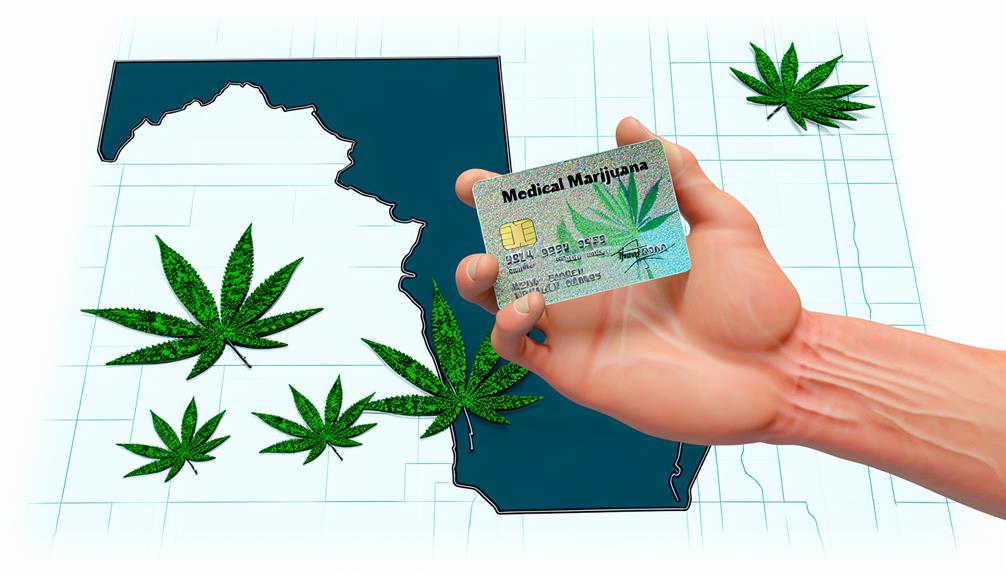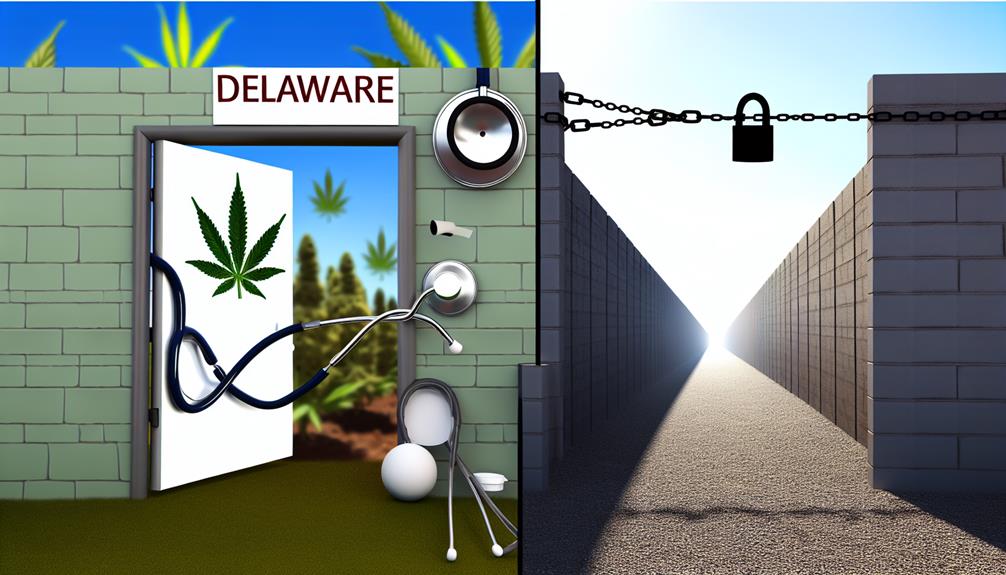You’ve probably heard about Delaware’s medical marijuana laws, but do you understand how they’re improving access for patients? Thanks to the Compassionate Use Act, the state has established a framework for safe distribution and production. They’ve broadened qualifying conditions and increased the presence of regulated dispensaries. It’s not just about easier access; it’s also about quality care and support for patients. But there’s more to this story. Want to find out how these laws are evolving and what they could mean for the future of medical marijuana in Delaware?
Understanding Delaware’s Medical Marijuana Laws

Navigating through Delaware’s medical marijuana laws can seem like traversing a complex maze. However, with patience and attention to detail, you’ll grasp the legal framework in no time.
The crux of these laws is patient rights. As a patient, you’re entitled to grow, purchase, and use marijuana for medical purposes. However, there are specific conditions you must meet such as having a qualifying medical condition, obtaining a written recommendation from a physician, and applying for a medical marijuana card.
But it doesn’t end there. The law also specifies the quantity you can possess – no more than six ounces at any given time. You can’t use your medical marijuana in public or while driving. And self-cultivation is prohibited – you must purchase it from a state-licensed dispensary.
Understanding these laws is crucial not just for compliance but also to maximize the benefits of using medical marijuana. They’re designed to ensure safety, regulate usage, and protect you from potential legal issues.
After all, serving others begins with understanding and respecting the rules we all live by.
The History of Medical Marijuana in Delaware

In 2011, Delaware became the 16th state in the nation to legalize medical marijuana. This was a significant legal milestone that reflected patient advocacy efforts and set the pace for future reforms.
The initial approval process wasn’t without challenges. Tight regulations and a cautious approach to implementation meant that it took until 2015 for the first dispensary to open its doors. Despite this, patient advocates didn’t waver in their push for easier access to medical marijuana.
In 2016, further progress was made as lawmakers expanded the list of qualifying medical conditions. This inclusive move demonstrated growing acceptance and understanding of medical marijuana’s therapeutic potential.
Another significant step came in 2019 when Delaware decriminalized private use of marijuana, reducing penalties for possession to a civil fine rather than a criminal offense.
Through these legal milestones, Delaware has shown progressive recognition of the medicinal value of marijuana.
The history of medical marijuana in Delaware is a story of patient advocacy, legal challenges, and gradual acceptance. It’s a testament to the power of advocacy, importance of thorough laws, and potential for change despite societal resistance.
The Role of Delaware’s Compassionate Use Act

Delaware’s Compassionate Use Act plays a crucial role in the state’s medical marijuana landscape. This legislation, enacted in 2011, is a beacon of compassionate care, designed to make medical marijuana accessible to patients in need.
The Act facilitates patient accessibility by allowing certified physicians to recommend medical marijuana for a range of qualifying conditions. This signifies a major breakthrough for those suffering from chronic or debilitating diseases, as they can now access an alternative, potentially more effective treatment.
Moreover, the Act establishes a regulatory framework for the production and distribution of medical marijuana, ensuring a safe and controlled supply chain. It’s not just about providing patients access; it’s about ensuring the product they receive is safe and regulated.
Lastly, the Act is significant for its patient protection provisions. It prohibits discrimination against medical marijuana patients in areas such as employment and housing. This means you, as a patient, can use medical marijuana without fear of societal backlash.
How to Obtain a Medical Marijuana Card in Delaware

Building on the foundational framework of Delaware’s Compassionate Use Act, the next step for patients seeking relief through medical cannabis is obtaining a medical marijuana card.
The application process begins with visiting the Delaware Health and Social Services website where you’ll find an application that must be completed by both you and your physician.
It’s important to note that your doctor must certify that you have a condition that qualifies for medical marijuana use. The application process requires a $125 fee, but there are provisions for low-income patients that can reduce this cost.
Patient eligibility involves several factors. You must be a Delaware resident with proof of residency.
Also, you must be diagnosed by a Delaware-licensed physician who has an established physician-patient relationship with you. You can’t simply visit any doctor; it must be a physician who’s been treating you for your qualifying condition.
Qualifying Conditions for Medical Marijuana Use

What conditions qualify for medical marijuana use in Delaware? Understanding the qualifying conditions is crucial in determining patient eligibility for medical marijuana. In Delaware, these conditions aren’t random but are based on thorough medical research.
The four main categories of qualifying conditions include:
- Chronic illnesses: These include conditions such as cancer, HIV/AIDS, decompensated cirrhosis, Amyotrophic Lateral Sclerosis (ALS), and more.
- Severe, debilitating pain: If the pain is unresponsive to other treatments or pharmaceuticals for more than three months, it qualifies.
- Neurological conditions: This includes conditions like epilepsy, Multiple Sclerosis (MS), and severe muscle spasms.
- Mental health disorders: Post-traumatic stress disorder (PTSD) is the primary condition under this category.
It’s important to note that the above list isn’t exhaustive. Delaware’s Department of Health and Social Services can approve other conditions based on solid clinical evidence.
This consideration ensures that all patients who can genuinely benefit from medical marijuana get the opportunity to do so. Knowledge of these qualifying conditions empowers both patients and caregivers, fostering a more compassionate healthcare environment.
The Impact on Patients’ Lives

Understanding these qualifying conditions for medical marijuana use in Delaware is about more than just legality – it’s about the profound impact it has on patients’ lives. It’s about improving quality of life for thousands of people.
These laws aren’t merely about breaking barriers; they’re about offering patient benefits that can genuinely transform lives. With access to medical marijuana, patients suffering from debilitating conditions have an alternative, natural remedy to turn to. They’re provided with a chance to manage their symptoms, alleviate pain, and restore balance in their lives.
For some, it’s about regaining control over a life dominated by seizures or relentless pain. For others, it’s about finding relief from unbearable side effects of chemotherapy. Each story is unique, each struggle personal but the result is common – improved quality of life.
Delaware’s laws on medical marijuana have made this possible. They’ve provided an avenue for relief where traditional medicine may have failed or caused unwanted side effects.
They’ve given patients the opportunity to live more comfortably and enjoy life without the constant shadow of pain. It’s about more than just access to medical marijuana. It’s about hope, relief, and a chance at a better life.
The Evolution of Medical Marijuana Dispensaries

As the landscape of medical marijuana laws has shifted, so too has the face of dispensaries. They have evolved from shadowy, back-alley businesses to professional establishments providing essential healthcare services.
This transformation can be largely attributed to tightening dispensary regulations and an increased focus on patient accessibility. Here’s a snapshot of the evolution:
- Early Days: Initially, dispensaries were unregulated and often operated in legal grey areas. They were seen as illicit, serving a stigmatized clientele.
- Regulation: With the push for medical marijuana legalization, governments started implementing dispensary regulations introducing licensing and operational standards.
- Professionalism: Dispensaries began adopting a more professional approach by employing trained staff and improving their customer service.
- Accessibility: Patient accessibility became a priority. Dispensaries now offer services like home delivery, online ordering, and personalized consultations.
Through this evolution, dispensaries have become integral parts of their communities. They’re no longer just places to buy cannabis; they’re healthcare providers that you can count on as a patient.
They serve an essential purpose by making medical marijuana accessible to those who need it most.
Future Projections for Delaware’s Medical Marijuana Laws

Looking ahead, the future of Delaware’s medical marijuana laws seems promising. Experts are monitoring future trends and potential legislative changes, which could further streamline access and remove barriers for patients in need.
Your commitment to serving others in the medical marijuana industry is likely fueling your interest in these future projections. It’s clear that accessibility and patient care are prioritized in the state’s approach.
Delaware’s lawmakers are actively working to refine their policies, ensuring they’re as inclusive and effective as possible.
One anticipated trend is an expansion of qualifying conditions. This means more patients could have access to this essential treatment.
Lawmakers may also increase the number of dispensaries, allowing for better geographical coverage across the state. Additionally, proposed legislative changes could see the implementation of home cultivation laws, providing patients with even greater access to their medicine.
Comparing Delaware’s Laws to Other States

While Delaware’s medical marijuana laws are progressive, when compared to other states there is a spectrum of legislative approaches to assess. To understand these legislative nuances, we’ll look at four state comparisons:
- California: Known for its liberal stance, California allows medical marijuana use for any debilitating illness. This is a broader scope compared to Delaware’s specified list of conditions.
- Texas: In contrast, Texas has one of the most restrictive programs. Only patients with intractable epilepsy can access low-THC cannabis, highlighting the stark contrast to Delaware’s more inclusive laws.
- Florida: Similar to Delaware, Florida also has a thorough program. However, Florida allows full-strength marijuana for terminally ill patients, an area where Delaware has room to grow.
- Colorado: Known for its recreational and medical use, Colorado provides a perspective on where Delaware’s laws might head with future liberalization.
As you come to grips with these differences, remember that each state’s approach is tailored to their citizens’ needs. This comparison allows you to appreciate the progressiveness of Delaware’s laws while recognizing areas for potential growth and change.
With this knowledge, you’re better equipped to serve others navigating this complex world of medical marijuana legislation.
Conclusion
Delaware’s medical marijuana laws guide patients towards relief like a lighthouse in the fog. They symbolize progress and shine a beacon of hope for those battling qualifying conditions. These ever-evolving laws demonstrate Delaware’s commitment to patient care. As the landscape shifts nationwide, Delaware stands as a pioneer charting the course for others to follow. The future holds promise and Delaware’s medical marijuana laws are lighting the way.
If you’re curious about how these laws can benefit you or a loved one, I warmly invite you to visit Cannabis Docs of Delaware. Our team is here to provide all the information and support you need. Feel free to give us a call at (855) 420-6797. We’re always happy to help and answer any questions you might have!
The post How Delaware’s Medical Marijuana Laws Make Access Easier appeared first on Delaware Cannabis Docs.
source https://delawarecannabisdocs.com/how-delawares-medical-marijuana-laws-make-access-easier/

No comments:
Post a Comment